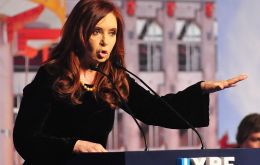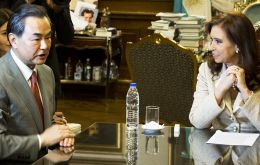MercoPress. South Atlantic News Agency
Economy
-
Friday, April 25th 2014 - 06:04 UTC
After a long debate, Argentine Congress approves Repsol/YPF agreement terms

After a 16-hour debate, Argentina's Lower House passed the law to pay Spanish Repsol 5 billion dollars in bonds to compensate for the 2012 seizure of a majority stake in Argentina's energy company YPF.
-
Friday, April 25th 2014 - 05:45 UTC
Lay-offs hit Brazilian auto industry following advancing drop in sales

Volkswagen said on Thursday it will lay off 900 autoworkers at two Brazilian plants, one of the biggest recent efforts to cut output in the face of sluggish demand for cars in Latin America's largest economy. Brazil is the No. 4 market for Volkswagen after China, Germany and the United States.
-
Friday, April 25th 2014 - 05:41 UTC
Mantega confident that this year the 'the villain factor' in inflation is contained

Ever-optimistic Brazilian Finance Minister Guido Mantega said a recent rise in consumer prices was expected, ('there's always a villain factor pushing inflation')' anticipating that in May/June the index will be lower. Mantega also denied local news reports that the government was seeking a change in the index methodology as a way to eliminate the impact of volatile food prices.
-
Friday, April 25th 2014 - 05:36 UTC
Latin America's fast growing decade is coming to an end, anticipates IMF report

The IMF’s Regional Economic Outlook for the Western Hemisphere, released on Thursday in Lima, Peru, projects regional growth of 2½ percent in 2014, down from 2¾ percent in 2013. Weak investment and subdued demand for the region’s exports held back activity in 2013, as did increasingly binding supply bottlenecks in a number of economies. For 2015, the IMF projects a modest pickup, to 3%.
-
Friday, April 25th 2014 - 05:31 UTC
Brazil investigating potential case of atypical mad cow disease in Matto Grosso

Brazil is investigating a potential case of atypical mad cow disease, the agriculture ministry said on Thursday, just over a year after several countries banned Brazilian beef imports when a similar case of the disease was confirmed.
-
Thursday, April 24th 2014 - 08:11 UTC
Argentine and China reaffirm close trade and political links

Argentine President Cristina Fernández received on Wednesday China’s Foreign Ministry Wang Yi and signed several trade agreements, including aerospace infrastructure at the Government House, Buenos Aires City. During the meeting, the president was accompanied by Cabinet Chief Jorge Capitanich, Economy Minister Axel Kicillof, Federal Planning Minister Carlos Julio De Vido and Foreign Minister Héctor Timerman, with whom Wang Yi had a previous meeting.
-
Thursday, April 24th 2014 - 07:59 UTC
China making inroads into Brazilian trade with Argentina, says CNI

Argentina's economic situation has hit Brazil harder than its other commercial partners, as China has been making inroads into Brazilian trade with Argentina. Chinese exports to Argentina have more than tripled in the last ten years, according to a study carried out by Brazil's National Confederation of Industry, (CNI).
-
Thursday, April 24th 2014 - 07:42 UTC
Falkland Islands' “Agency of the Year” for Sulivan Shipping

“Agency of the Year”, for Sulivan Shipping and “Managing Director” to Roddy Napier, were among the outstanding performers of the Falkland Islands third Tourism Awards presentation which took place at Government House, Stanley, with the presence of Acting Governor John Duncan, tourist board and industry representatives and a large crowd.
-
Thursday, April 24th 2014 - 07:10 UTC
Paraguay moving closer to Pacific Alliance; expects invitation for summit in Mexico

A top Paraguayan official will be travelling to Colombia to establish 'closer links' with the Pacific Alliance and advance with the country's full membership request. Paraguay currently with observer status is also waiting for the official invitation to participate in the Pacific Alliance summit scheduled for 22 June in Mexico.
-
Wednesday, April 23rd 2014 - 09:28 UTC
Argentina's high court rules export levies are unconstitutional; case benefits shrimp exporter

Argentina's Supreme Court ruled as unconstitutional a Ministry of Economy resolution imposing export taxes on the overseas sale of produce from Camaronera Patagonica. Following the ruling the Patagonia shrimp company should be able to recover the levies on exports charged between March and August 2002.
